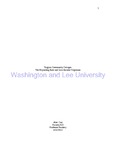Virginia Community Colleges: The Expanding Role and Low-Income Virginians

View/
Author
Carr, Alexander E.
Subject
Washington and Lee University, Shepherd Poverty Program
Community colleges
Virginia
Vocational education
Skilled labor -- Training of
Metadata
Show full item recordDescription
Capstone; [FULL-TEXT FREELY AVAILABLE ONLINE] Alexander E. Carr is a member of the Class of 2012 of Washington and Lee University. The community college system in Virginia has experienced a generation of change. Recently, with the implementation of a statewide guaranteed admission policy, community college has expanded upon the base demographic from which it traditionally attracts students. This change has implications for both the services offered and students traditionally served by community colleges. Expansion has drawn attention away from vocational programs and the low-income students historically served by community college. Community colleges expansion into the transfer role provides positives for both low-income and more well off students, but its integration into traditional community college presents problems for traditional community college students and vocational programs. In order to maintain its commitment to low-income students, community colleges should divide their vocational and transfer-oriented programs into two distinct institutions. This would allow each program to more efficiently provide the best services to the specific demographic it serves. Alex Carr